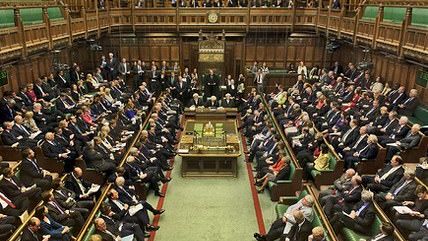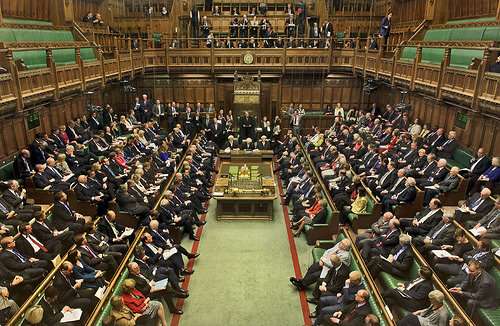U.K. Lawmakers Actually Vote on Waging War, an Example the U.S. Should Follow


Yesterday, something remarkable happened. The elected lawmakers of an English-speaking democracy considered a proposal by the head of government to wage war against another country. After debating the idea, they effectively told him to go pound sand, voting the idea down. Those deliberating legislators weren't American, of course — increasingly rarely does the United States do anything so quaint as setting Congress to the task of approving or disapproving warmaking. The contrast between the vote in the U.K. parliament and the lack thereof in Congress couldn't be more stark.
The increasingly unilateral nature of U.S. foreign policy — especially in its lethal aspects — has been something of a cooperative project in constitutional dysfunction. For all that presidents of both parties are loath to ask the legislative branch to exercise its power to declare war under Article 1, Section 8, of the Constitution, many lawmakers are equally resistant to being committed by an actual up or down vote in a way that might force them to take responsibility for the next bloody and unpopular fiasco. House Speaker John Boehner asked President Obama to "make the case to the American people and Congress for how potential military action will secure American national security interest…" and whether action against Syria might require Congress to authorize more money, but he hasn't called for an actual vote. Pointedly, he hasn't signed on to Rep. Scott Rigell's (R-VA) letter (PDF) demanding that President Obama "consult and receive authorization from Congress before ordering the use of U.S. military force in Syria." That letter is now up to 140 signatures from lawmakers of both major parties, but that's still a minority of the membership of the House of Representatives.
President Obama, for his part, was once an enthusiastic believer in the idea that "[t]he President does not have power under the Constitution to unilaterally authorize a military attack in a situation that does not involve stopping an actual or imminent threat to the nation." But that was before he took up residence in the White House and faced the possibility that Congress, like the U.K. parliament, might say "no."
Obama certainly didn't invent unilateral presidential warmaking. The War Powers Resolution passed almost exactly forty years ago in response to a Republican president who had a similar tendency to kill people and blow things up by his own leave. Presidents from both parties have made a habit of thumbing their noses at Congress and that resolution since then.
In fact, unilateral executive action has become so rote that American officials seem to forget that it can be done any other way. After parliament rejected action against Syria, The Guardian reported, "The US appears to have taken British support for granted. Hours before the vote, the chairman of the Senate intelligence committee, Diane Feinstein, expressed confidence that Britain would join any strike." Politico describes the administration as preparing to go it alone after British lawmakers' "stunning rejection" of war.
But a negative vote isn't stunning. Polling shows the British public overwhelmingly opposed to strikes against Syria. Lawmakers there voted in accordance with popular sentiment.
The American public, for its part, is somewhat supportive of standoff cruise missile attacks without boots on the ground, according to NBC polling — a tactic that might make for spectacular explosions, but doesn't necessarily guarantee any change of heart by Syria's government. But Americans also overwhelmingly want the president to seek congressional approval before attacking, according to the same poll.
If President Obama is feeling lonely after the British vote, asking Congress to debate military action would give him excellent cover for either gathering support or backing away from unilateral warmaking — and it would also abide by the Constitution. That's an approach Barack Obama himself would have approved, not so many years ago.


Show Comments (47)